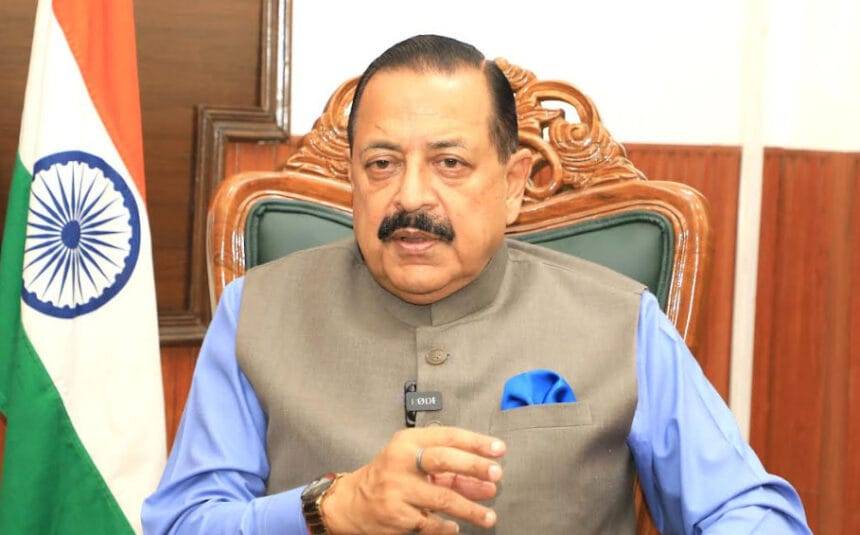Main Points In Hindi (मुख्य बातें – हिंदी में)
-
सरकारी दृष्टिकोण और पहल: केंद्रीय मंत्री डॉ. जितेंद्र सिंह ने प्रधानमंत्री नरेंद्र मोदी के तीसरे कार्यकाल के पहले 100 दिनों में विज्ञान और प्रौद्योगिकी के क्षेत्र में बड़ी पहल का जिक्र किया, जिसमें ₹1,000 करोड़ का वेंचर कैपिटल फंड और बायोई3 नीति शामिल है। इन पहलों का उद्देश्य भारत को वैश्विक नवाचार में एक महत्वपूर्ण भूमिका में लाना है।
-
अंतरिक्ष क्षेत्र में प्रगति: सरकार ने अंतरिक्ष स्टार्टअप्स के लिए समर्थन बढ़ाने के लिए उद्यम पूंजी कोष की घोषणा की, जिससे भारत के अंतरिक्ष पारिस्थितिकी तंत्र में तेजी का अनुभव हो रहा है। डॉ. सिंह ने वैश्विक मान्यता, जैसे चंद्रयान-3 मिशन, को इस दिशा में एक महत्वपूर्ण उपलब्धि बताया।
-
जैव प्रौद्योगिकी और बायोई3 नीति: डॉ. सिंह ने बायोई3 नीति की घोषणा की, जिसका उद्देश्य जैविक संसाधनों का प्रभावी उपयोग कर टिकाऊ और आत्मनिर्भर विकास करना है। यह नीति पर्यावरण संरक्षण, अर्थव्यवस्था और रोजगार के लिए महत्वपूर्ण मानी जा रही है।
-
मौसम विज्ञान में सुधार: मिशन मौसम के माध्यम से मौसम पूर्वानुमानों की सटीकता को बढ़ाने पर जोर दिया गया है, जो केवल भारत नहीं, बल्कि पड़ोसी देशों के लिए भी हितकर होगा। नए एआई-संचालित ऐप द्वारा कृषि क्षेत्र को सशक्त करने के लिए विश्वसनीय पूर्वानुमान प्रदान करने का लक्ष्य है।
- वैज्ञानिक सहयोग और अंतरराष्ट्रीय साझेदारी: डॉ. सिंह ने भारत-जर्मनी विज्ञान साझेदारी का उल्लेख किया, जो जैव प्रौद्योगिकी और नवीकरणीय ऊर्जा जैसे क्षेत्रों में वैज्ञानिक महत्वाकांक्षाओं को पूरा करने में मदद कर रही है। यह अंतरराष्ट्रीय सहयोग आत्मनिर्भरता और वैश्विक नेतृत्व के लिए आवश्यक है।
Main Points In English(मुख्य बातें – अंग्रेज़ी में)
Here are the main points from the article excerpt featuring Dr. Jitendra Singh’s interview:
-
Bold Vision for Science and Technology: Central Minister Dr. Jitendra Singh expressed that the Modi 3.0 government aims to advance India’s science and technology sectors, with a focus on realizing a ‘developed India.’ The government has launched significant initiatives intended to enhance India’s global role in innovation.
-
Support for Space Startups: The Modi government has announced a ₹1,000 crore venture capital fund to support space startups, aiming to capitalize on the growing ecosystem of approximately 300 space startups in India. This shift toward privatizing space exploration has transformed India’s space sector and increased its innovation capabilities.
-
Bio-E3 Policy for Sustainable Development: Dr. Singh presented the Bio-E3 policy aimed at fostering a bio-economy, reducing reliance on petroleum-based resources, and encouraging sustainability practices. This initiative aligns with the goal of ensuring self-sufficiency in resources while promoting environmental sustainability.
-
Advancements in Meteorology: The initiative called ‘Mission Weather’ aims to improve the accuracy of weather predictions using AI and other technologies, benefiting not only India but also neighboring countries. This mission is part of a broader effort to enhance India’s capabilities in meteorology and prepare citizens for weather-related events.
- International Collaboration and Self-Reliance: Dr. Singh emphasized the importance of collaboration, referencing the India-Germany science partnership, and underscored the government’s commitment to self-reliance and global leadership through strategic investments in science and technology. He highlighted that these efforts are designed to directly benefit citizens and respond to national challenges.


Complete News In Hindi(पूरी खबर – हिंदी में)
नई दिल्ली, 27 अक्टूबर: एक राष्ट्रीय मीडिया हाउस को दिए एक विशेष साक्षात्कार के दौरान भविष्योन्मुखी चर्चा में, केंद्रीय मंत्री डॉ. जितेंद्र सिंह ने भारत के विज्ञान और प्रौद्योगिकी क्षेत्रों के लिए सरकार की साहसिक और रणनीतिक दृष्टि को सामने रखा और कहा कि मोदी 3.0 “विज्ञान को आगे बढ़ाएगा” ” का उद्देश्य “विकसित भारत” को साकार करना है।
व्हाट्सएप पर दैनिक एक्सेलसियर से जुड़ने और नवीनतम समाचार प्राप्त करने के लिए यहां क्लिक करें
स्पेस स्टार्टअप्स को समर्थन देने के लिए ₹1,000 करोड़ का वेंचर कैपिटल फंड लॉन्च करने से लेकर बायोइकोनॉमी बनाने के उद्देश्य से बायो ई3 नीति पेश करने तक, अपने तीसरे कार्यकाल के पहले 100 दिनों में मोदी सरकार की प्रमुख पहल वैश्विक नवाचार पर भारत की भूमिका को आगे बढ़ाने की प्रतिबद्धता को दर्शाती है। मंच पर मंत्री ने कहा..
मंत्री ने इस बात पर प्रकाश डाला कि ये पहल न केवल भारत की वैज्ञानिक शक्ति को बढ़ाती हैं बल्कि एक टिकाऊ, आत्मनिर्भर अर्थव्यवस्था में भी योगदान देती हैं जो उद्योग और संसाधनों में वैश्विक बदलाव का सामना कर सकती है।
डॉ. जितेंद्र सिंह ने शुरुआत में इस बात पर जोर दिया कि भारत ने विज्ञान और प्रौद्योगिकी में बड़े सुधारों को किस गति से अपनाया है। उन्होंने कहा, “प्रधानमंत्री मोदी के तीसरे कार्यकाल के पहले 100 दिनों में, हमने विज्ञान, प्रौद्योगिकी और नवाचार में परिवर्तनकारी बदलावों की नींव रखी है।” उन्होंने बताया कि प्रधानमंत्री का दृष्टिकोण अंतरिक्ष अन्वेषण, जैव प्रौद्योगिकी और मौसम विज्ञान जैसे महत्वपूर्ण क्षेत्रों में भारत के नेतृत्व को सुनिश्चित करने के लिए दीर्घकालिक, लीक से हटकर पहल को प्राथमिकता देता है।
डॉ. जितेंद्र सिंह की बातचीत का एक प्रमुख आकर्षण विशेष रूप से अंतरिक्ष क्षेत्र के लिए ₹1,000 करोड़ के उद्यम पूंजी कोष की घोषणा थी। कैबिनेट द्वारा अनुमोदित यह फंड, भारत के लगभग 300 अंतरिक्ष स्टार्टअप के बढ़ते आधार का लाभ उठाने की एक व्यापक योजना का हिस्सा है। इस क्षेत्र को निजी खिलाड़ियों के लिए खोलने के सरकार के फैसले के बाद, कुछ ही वर्षों में, भारत ने अपने अंतरिक्ष पारिस्थितिकी तंत्र में एक उल्लेखनीय बदलाव देखा है।
डॉ. जितेंद्र सिंह के अनुसार, इस निर्णय ने भारत की क्षमता को अनलॉक करने में मदद की है, जिससे इसे आज एकल-अंकीय स्टार्टअप उपस्थिति से सैकड़ों अंतरिक्ष तकनीकी कंपनियों के साथ एक पारिस्थितिकी तंत्र तक बढ़ने की अनुमति मिली है।
डॉ. जितेंद्र सिंह ने चंद्रयान-3 मिशन जैसी उपलब्धियों से भारत को मिली वैश्विक मान्यता का संदर्भ देते हुए कहा, “भारत की अंतरिक्ष अर्थव्यवस्था हमारे देश के विकास में महत्वपूर्ण भूमिका निभाएगी।” उन्होंने गगनयान मिशन पर भी प्रकाश डाला, भारत का पहला मानव चालित अंतरिक्ष मिशन निर्धारित किया गया है, जिसमें मानव अंतरिक्ष यात्रियों को अंतरिक्ष में भेजने से पहले अंतिम ड्रेस रिहर्सल के रूप में एक महिला रोबोट परीक्षण उड़ान शामिल होगी। उन्होंने कहा, “हमारी प्रगति सिर्फ अन्य अंतरिक्ष यात्रा करने वाले देशों की कतार में शामिल होने के बारे में नहीं है, बल्कि नवाचार, सटीकता और विश्वसनीयता के साथ आगे बढ़ने के बारे में भी है।”
बायो ई3 नीति के साथ, डॉ. जितेंद्र सिंह ने “जैव-संचालित” भविष्य के लिए एक दृष्टिकोण को रेखांकित किया, जिसमें कहा गया कि अगली औद्योगिक क्रांति पारंपरिक विनिर्माण के बजाय जैव-अर्थव्यवस्था पहल से उत्पन्न होगी। नीति, जो पर्यावरण, अर्थव्यवस्था और रोजगार के लिए जैव प्रौद्योगिकी को कवर करती है, आयात पर निर्भरता को कम करते हुए संसाधनों में आत्मनिर्भरता बनाने के लिए डिज़ाइन की गई है। उन्होंने बताया कि एक मुख्य उद्देश्य पेट्रोलियम-आधारित संसाधनों से जैव ईंधन विकल्पों की ओर बदलाव, अपशिष्ट से ईंधन में परिवर्तन और अन्य टिकाऊ प्रथाओं को सक्षम करना है।
डॉ. जितेंद्र सिंह ने कहा, “हिमालय के किनारे समृद्ध जैवसंसाधन और 7,500 किलोमीटर लंबी तटरेखा सहित हमारे प्राकृतिक संसाधन हमें इस क्रांति को आगे बढ़ाने के लिए विशिष्ट रूप से सक्षम बनाते हैं।” “हम क्षेत्रों की जैव प्रौद्योगिकी क्षमता का दोहन कर रहे हैं, आर्थिक विकास सुनिश्चित कर रहे हैं जो समावेशी और पर्यावरणीय रूप से टिकाऊ दोनों है।”
डॉ. जितेंद्र सिंह ने मिशन मौसम पर महत्वपूर्ण अपडेट की भी घोषणा की, जो मोदी के तीसरे कार्यकाल के पहले 100 दिनों के भीतर शुरू की गई एक पहल है, जिसका उद्देश्य मौसम संबंधी पूर्वानुमानों की सटीकता को बढ़ाना है। मिशन, जो अंतरिक्ष और आईटी प्रौद्योगिकियों को एकीकृत करता है, भारत को न केवल भारत के लिए बल्कि बांग्लादेश, नेपाल और श्रीलंका सहित पड़ोसी देशों के लिए भी वास्तविक समय, कार्रवाई योग्य मौसम पूर्वानुमान प्रदान करने की अनुमति देता है।
मौसम विज्ञान में भारत की विरासत पर विचार करते हुए, उन्होंने स्वीकार किया कि यह क्षेत्र हाल तक पर्याप्त निवेश प्राप्त करने के लिए संघर्ष कर रहा है। “अब, हम केवल मौसम की भविष्यवाणी नहीं कर रहे हैं। हम नागरिकों को मौसम की घटनाओं के निहितार्थ को समझने और उसके अनुसार तैयारी करने में मदद कर रहे हैं, ”उन्होंने कहा। नए एआई-संचालित एप्लिकेशन किसानों और अन्य हितधारकों के लिए हाइपर-लोकल, घंटे-दर-घंटे पूर्वानुमान की अनुमति देंगे जो विश्वसनीय भविष्यवाणियों पर निर्भर हैं। डॉ. जितेंद्र सिंह ने जोर देकर कहा, “हमारा उद्देश्य वैश्विक-मानक पूर्वानुमान प्रदान करना और हमारे कृषि क्षेत्र को सशक्त बनाने वाले पूर्वानुमान मॉडल की ओर बढ़ना है।”
डॉ. जितेंद्र सिंह ने कहा कि प्रधानमंत्री मोदी के नेतृत्व में भारत के दृष्टिकोण की आधारशिला एक सर्वव्यापी रणनीति है, जहां वैज्ञानिक विषय अधिक प्रभावशाली परिणाम देने के लिए एकजुट होते हैं। उन्होंने इस बात पर प्रकाश डाला कि भारत के व्यापक विकासात्मक लक्ष्यों को प्राप्त करने के लिए इस तरह का सहयोग आवश्यक है, विज्ञान और तकनीकी क्षेत्र परिवर्तनकारी परिणाम लाने के लिए मिलकर काम कर रहे हैं।
डॉ. जितेंद्र सिंह ने इस संपूर्ण विज्ञान दृष्टिकोण के उदाहरण के रूप में भारत-जर्मनी विज्ञान साझेदारी की ओर इशारा किया। 50,000 से अधिक भारतीय छात्रों और शोधकर्ताओं की मेजबानी करने वाला जर्मनी, नवोन्मेषी परियोजनाओं पर काम करने वाले भारतीय विद्वानों के लिए एक पसंदीदा स्थान बन गया है। उन्होंने कहा, “जर्मनी और भारत का सहयोग, विशेष रूप से जैव प्रौद्योगिकी और नवीकरणीय ऊर्जा जैसे क्षेत्रों में, हमारी वैज्ञानिक महत्वाकांक्षाओं को साकार करने में अंतर्राष्ट्रीय साझेदारी के महत्व को रेखांकित करता है।”
डॉ. जितेंद्र सिंह ने इस बात पर जोर देकर अपनी बात समाप्त की कि सरकार की विज्ञान और प्रौद्योगिकी पहल आत्मनिर्भरता और वैश्विक नेतृत्व की प्रतिबद्धता में निहित हैं। अंतरिक्ष और जैव प्रौद्योगिकी में रणनीतिक निवेश करके, भारत न केवल आर्थिक विकास को बढ़ावा दे रहा है, बल्कि भविष्य की चुनौतियों से निपटने के लिए आवश्यक स्थायी लक्ष्यों के साथ भी जुड़ रहा है। उन्होंने जोर देकर कहा कि ये नीतियां उन क्षेत्रों में नेतृत्व करने की देश की महत्वाकांक्षा को दर्शाती हैं जो आर्थिक लचीलेपन और जनता की भलाई दोनों को प्रभावित करते हैं।
डॉ. जितेंद्र सिंह ने पुष्टि की कि आत्मनिर्भर, वैज्ञानिक रूप से उन्नत भविष्य की ओर भारत की यात्रा को प्रत्येक नई नीति, फंड और साझेदारी के साथ मैप किया जा रहा है। “हमारा लक्ष्य विज्ञान को भारत के लिए कार्यशील बनाना है – हमारी चुनौतियों का समाधान करना, हमारी अर्थव्यवस्था को आगे बढ़ाना और यह सुनिश्चित करना कि हमारे प्रत्येक नवाचार और सफलता से हमारे नागरिकों को सीधे लाभ हो।”
Complete News In English(पूरी खबर – अंग्रेज़ी में)
New Delhi, October 27: In a special interview with a national media outlet, Union Minister Dr. Jitendra Singh outlined the government’s bold and strategic vision for India’s science and technology sectors. He stated that the goal of Modi 3.0 is to push science forward and realize a “developed India”.
Click here to join Daily Excelsior on WhatsApp for the latest news
The Modi government is showing its commitment to enhancing India’s role in global innovation with key initiatives, such as launching a ₹1,000 crore venture capital fund to support space startups and introducing the Bio-E3 policy aimed at creating a bio-economy. During his speech, the minister emphasized that these initiatives not only boost India’s scientific capabilities but also contribute to a sustainable and self-reliant economy resilient to global changes. Dr. Jitendra Singh highlighted that India has rapidly adopted major reforms in science and technology. He stated, “In the first 100 days of Prime Minister Modi’s third term, we have laid the groundwork for transformative changes in science, technology, and innovation.” He pointed out that the Prime Minister’s approach prioritizes long-term, unconventional initiatives to ensure India’s leadership in critical areas like space exploration, biotechnology, and meteorology.
A significant highlight of Dr. Jitendra Singh’s discussion was the announcement of a ₹1,000 crore venture capital fund specifically for the space sector. Approved by the Cabinet, this fund is part of a broader strategy to harness the growing ecosystem of around 300 space startups in India. Following the government’s decision to open up this sector to private players, India has witnessed a remarkable transformation in its space ecosystem within a few years.
According to Dr. Jitendra Singh, this decision has helped unlock India’s potential, allowing it to grow from a single-digit number of startups to a thriving ecosystem of hundreds of space technology companies. Citing global recognition earned through achievements like the Chandrayaan-3 mission, he remarked, “India’s space economy will play a crucial role in our country’s development.” He also highlighted the Gaganyaan mission, India’s first manned space mission, which is set to include a test flight with a female robot before sending human astronauts into space. Dr. Singh stated, “Our progress is not just about joining the ranks of other spacefaring nations, but about advancing with innovation, precision, and reliability.”
With the Bio-E3 policy, Dr. Jitendra Singh outlined a vision for a “bio-driven” future, stating that the next industrial revolution will be rooted in bio-economy initiatives rather than traditional manufacturing. This policy, which encompasses biotechnology’s impact on the environment, economy, and employment, is designed to reduce dependency on imports while fostering self-reliance in resources. He noted that a key objective is to shift from petroleum-based resources to biofuel options, transform waste into fuel, and enable other sustainable practices.
He emphasized, “Our rich biodiversity along the Himalayas and 7,500 kilometers of coastline uniquely positions us to lead this revolution.” Dr. Singh pointed out, “We are tapping into the biotechnology potential of various sectors to ensure economic growth that is both inclusive and environmentally sustainable.”
Dr. Jitendra Singh also announced significant updates on the Mission Weather, an initiative launched within the first 100 days of Modi’s third term aimed at improving the accuracy of weather forecasts. By integrating space and IT technologies, the mission will enable India to provide real-time, actionable weather forecasts not only for itself but also for neighboring countries like Bangladesh, Nepal, and Sri Lanka.
Reflecting on India’s rich history in meteorology, he recognized that this field had struggled to attract sufficient investment until recently. “Now, we are not just forecasting weather; we are helping citizens understand the implications of weather events and prepare accordingly,” he said. New AI-driven applications will allow farmers and other stakeholders to access hyper-local, hour-by-hour forecasts based on reliable predictions. Dr. Jitendra Singh emphasized, “Our goal is to provide globally recognized forecasts and develop predictive models that empower our agricultural sector.”
He asserted that under Prime Minister Modi’s leadership, India’s vision is based on a comprehensive strategy where scientific fields unite to deliver impactful results. He highlighted that such collaboration is essential to achieve India’s broader developmental goals, with the science and technology sectors working together for transformative outcomes. He pointed to the India-Germany science partnership as a prime example of this collaborative scientific vision. Germany, hosting over 50,000 Indian students and researchers, has become a favored destination for Indian scholars working on innovative projects. He noted, “The collaboration between Germany and India, particularly in fields like biotechnology and renewable energy, underscores the importance of international partnerships in realizing our scientific ambitions.”
Dr. Jitendra Singh concluded by emphasizing that the government’s initiatives in science and technology are rooted in the commitment to self-reliance and global leadership. By making strategic investments in space and biotechnology, India is not only promoting economic growth but also aligning itself with the sustainable goals necessary to tackle future challenges. He stressed that these policies reflect the country’s ambition to lead in sectors that impact both economic resilience and public welfare.
He affirmed that India’s journey towards a self-reliant and scientifically advanced future is being mapped out with each new policy, fund, and partnership. “Our goal is to make science work for India – to solve our challenges, advance our economy, and ensure that every innovation and success directly benefits our citizens.”
This revised passage maintains the essential details and information while presenting it in a more straightforward and accessible manner.










